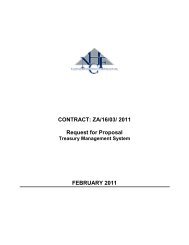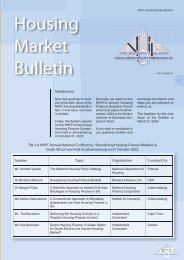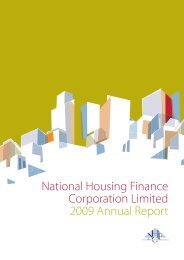housing - National Housing Finance Corporation
housing - National Housing Finance Corporation
housing - National Housing Finance Corporation
Create successful ePaper yourself
Turn your PDF publications into a flip-book with our unique Google optimized e-Paper software.
CHIEF EXECUTIVE’S REPORT CONTINUED<br />
NHFC assisted in the drafting of the Home Loans and<br />
Mortgages Disclosure Act (HLMDA), which was<br />
promulgated in 2000.<br />
Cumulatively, NHFC disbursements had, by then, also<br />
exceeded the R1 billion mark.<br />
That year also saw NHFC undertake a most intensive<br />
and extensive <strong>housing</strong> finance research project. The<br />
Unblocking <strong>Finance</strong> for Affordable <strong>Housing</strong> in South<br />
Africa (UNFAH) sought to:<br />
u create an understanding of the nature and scope of<br />
problems that impeded the <strong>housing</strong> finance process;<br />
identify any blockages in the <strong>housing</strong> finance delivery<br />
process; and<br />
u expose issues that would be verified scientifically by<br />
conducting periodic end-user surveys.<br />
UNFAH findings pointed to the need for NHFC to alter<br />
the way in which it did business if it desired maximum<br />
impact. So, in 2001 NHFC was restructured. The<br />
existing operational units were coalesced into three new<br />
product streams:<br />
u Home Ownership (HOD) to facilitate the ownership<br />
of affordable homes by funding intermediaries whose<br />
business it was to expand home ownership among<br />
low and medium-income households;<br />
u Alternative Tenure (AT) to provide project finance to<br />
emerging and sustainable social <strong>housing</strong> institutions<br />
in order to develop tenure options other than<br />
immediate ownership; and,<br />
u Incremental <strong>Housing</strong> (IH) to fund niche lenders who<br />
assisted low and medium-income households with<br />
loans to buy land, renovate existing homes or top up<br />
their capital subsidy with credit.<br />
Recognising the importance of accurate and reliable<br />
data and information, the <strong>Corporation</strong> also established<br />
a Policy and Research unit.<br />
RHLF and SHF left the NHFC stable and went their<br />
separate ways.<br />
NHFC was intrinsically involved in the conceptualisation<br />
and drafting of anti-redlining legislation, which all nine<br />
NEDLAC constituencies agreed to support at a Financial<br />
Sector Summit in August 2002. The Community<br />
Reinvestment (<strong>Housing</strong>) Bill was published in the<br />
Government Gazette for public comment on 17 May 2002.<br />
Purporting to change the whole <strong>housing</strong> finance<br />
landscape, the Financial Sector Charter was signed on<br />
17 October 2003. Initially, this initiative pledged<br />
R20 billion, and then R42 billion, to low-income <strong>housing</strong><br />
over a five-year period beginning on 1 January 2004.<br />
NHFC served as a key resource to the <strong>National</strong><br />
Department of <strong>Housing</strong> in its deliberations with the<br />
banks. Cabinet agreed to withhold the promulgation of<br />
the Community Reinvestment (<strong>Housing</strong>) Bill to give the<br />
Financial Sector Charter a chance. On 31 March 2005,<br />
the new Minister of <strong>Housing</strong>, Dr Lindiwe Sisulu, signed<br />
a Memorandum of Understanding with the CEOs of the<br />
four major banks and the Managing Director of the<br />
Banking Association of South Africa.<br />
In 2003, NHFC commissioned its first Corporate Impact<br />
Study and undertook a ground-breaking Rental Default<br />
Study. It also assisted the <strong>National</strong> Department of<br />
<strong>Housing</strong> to set up the Office of Disclosure to administer<br />
the reports required under the Home Loans and<br />
Mortgages Disclosure Act.<br />
An additional milestone for the <strong>Corporation</strong> is the critical<br />
role it played in the transformation of ICHUT, now<br />
known as the Trust for Urban <strong>Housing</strong> <strong>Finance</strong> (TUHF),<br />
into a respected <strong>housing</strong> development finance institution,<br />
which conducts financing of private landlords involved in<br />
inner city <strong>housing</strong> projects. The <strong>Corporation</strong> provided<br />
concessionary funding of R10 million in 2003 that saw<br />
TUHF being able to raise further debt funding in excess<br />
of R250 million by 2006. TUHF has contributed 5 836<br />
units towards the NHFC <strong>housing</strong> impact to date.<br />
NHFC spearheaded the establishment of the Social<br />
<strong>Housing</strong> Support Programme; contributed to the<br />
formulation of the Breaking New Ground main document;<br />
and served on the advisory committees of the <strong>National</strong><br />
Credit Bill, Dedicated Banks Bill and Co-operatives<br />
Banks Bill.<br />
The development of a <strong>housing</strong> project in Kliptown was<br />
in commemoration of the signing of the Freedom<br />
10 NHFC ANNUAL REPORT 2006






